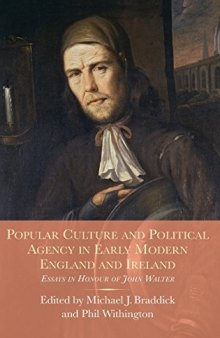 جزییات کتاب
جزییات کتاب
One of the most notable currents in social, cultural and political historiography is the interrogation of the categories of 'elite' and 'popular' politics and their relationship to each other, as well as the exploration of why andhow different sorts of people engaged with politics and behaved politically. While such issues are timeless, they hold a special importance for a society experiencing rapid political and social change, like early modern England.No one has done more to define these agendas for early modern historians than John Walter. His work has been hugely influential, and at its heart has been the analysis of the political agency of ordinary people. The essays in thisvolume engage with the central issues of Walter's work, ranging across the politics of poverty, dearth and household, popular political consciousness and practice more broadly, and religion and politics during the English revolution. This outstanding collection, bringing together some of the leading historians of this period with some of the field's rising stars, will appeal to anyone interested in the social, cultural and political history of early modern England or issues of popular political consciousness and behaviour more generally.MICHAEL J. BRADDICK is professor of history at the University of Sheffield. PHIL WITHINGTON is professor of history at the Universityof Sheffield.CONTRIBUTORS: Michael J. Braddick, J. C. Davis, Amanda Flather, Steve Hindle, Mark Knights, John Morrill, Alexandra Shepard, Paul Slack, Richard M. Smith, Clodagh Tait, Keith Thomas, Phil Withington, Andy Wood, Keith Wrightson.Table of ContentsIntroduction - Michael Braddick and Phil WithingtonJohn Walter and the social history of early modern England - Keith ThomasContrasting susceptibility to famine in early fourteenth- and late sixteenth-century England: the significance of late medieval rural social structural and village governmental changes - Richard SmithThe politics of English political economy in the 1620s - Paul SlackProvision, household management and the moral authority of wives and mothers in early modern England - Alexandra ShepardPopular senses of past time: dating events in the North Country, 1615-1631 - Keith WrightsonSpectral lordship, popular memory and the boggart of Towneley Hall - Andy WoodSelf-image and public image in the career of a Jacobean magistrate Sir John Newdigate in the Court of Star Chamber - Steve HindleGender, agency and religious change in early Stuart England - Amanda J. Flather'A Standard which can never fail us': the Golden Rule and the construction of a public transcript in early modern England - J.C. DavisReligion, anti-popery and corruption - Mark KnightsAn 'Aristotelian moment': democracy in early modern England - Phil WithingtonJohn Lilburne and political agency in revolutionary England - Michael BraddickAn Irish Protestation? Oaths and the Confederation of Kilkenny - John Morrill'Whereat his wife tooke great greef & died': dying of sorrow and killing in anger in seventeenth-century Ireland - Clodagh Tait



 دانلود کتاب
دانلود کتاب

 جزییات کتاب
جزییات کتاب





 این کتاب رو مطالعه کردید؟ نظر شما چیست؟
این کتاب رو مطالعه کردید؟ نظر شما چیست؟
